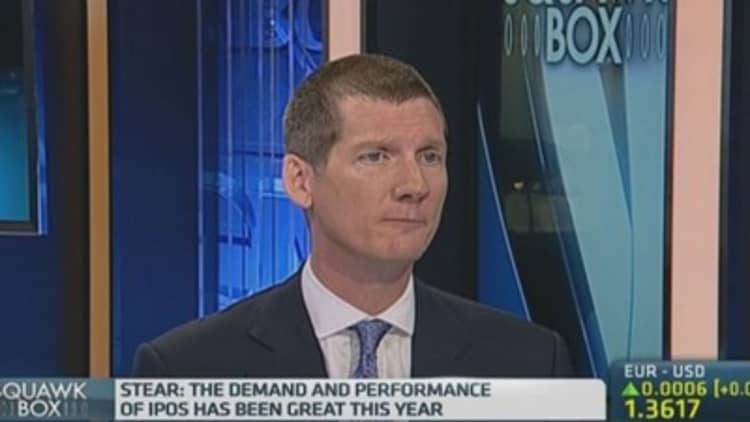
China shares have long been considered cheap for good reason, suffering a long downtrend, but some investors say now is the time to turn outright bullish.
"We have been cautious on China for most of the past three years," Guy Stear, head of research for Asia at Societe Generale, told CNBC.
But this year, he's been "very impressed" by the government's reform measures.
Read More First Chinese IPOs in 4 months see strong debuts
"That's made us a little more comfortable that the valuations are worth it," he said, adding that Societe Generale has turned bullish. "The valuations are quite cheap," Stear said.
Comparing valuations between U.S. and China shares on a price-to-book and medium-term economic growth basis, "you're probably talking about a valuation difference of four to one," he said.
In a June report, Societe Generale noted that index levels imply a 25 percent drop in earnings per share (EPS) over the next 12 months, compared with average EPS growth of 13 percent over the past five years, something it called "fairly pessimistic," adding "most, if not all, of the bad news seems priced in."
China's markets have been undermined by slowing economic growth as well as concerns over bad debts and the shadow banking and property sectors and its stock indexes have certainly been a losing proposition. The has fallen more than 30 percent over the past five years, even as other global markets have rallied solidly off lows touched during the global financial crisis.
Read More China's economy is at a 'tipping point'
While China shares have run up quite a bit since Societe Generale went to longer positions at the start of the second quarter, "we think there's another leg higher," he said. Societe Generale expects the H-Share index will reach 11,000 by year end. On Friday, it was trading around 10,287.
Stear tips another bullish sign for the China market: initial public offerings (IPOs) are picking up.
"What you typically see is that the busiest time for IPOs is when the market is bullish," he said, noting the recent offerings have been attractively priced and have met good demand. "It's a sign for me that our more bullish view has been justified," he said.
Read More Investing in China: A Catch-22?
Last week, in the first new listings in more than four months, three mainland companies made trading debuts on the Shenzhen Stock Exchange after drawing robust demand. Around 100 IPOs are expected to get regulators' approval this year, for a full-year tally of as much as 150.
Societe Generale isn't alone in seeing better days ahead for China shares.
Last week, Goldman Sachs said it expects the CSI 300 index to rise 5 percent in the third quarter and 10 percent by year end. The bank only expects EPS growth of 5 percent to take into account the risks from the property sector in the second half of the year.

"The series of reforms currently being promulgated (state-owned-enterprise reform, tax reform, financial reform, administrative reform, etc.) will gradually improve investor confidence towards China," Goldman said. "Furthermore, a potential round of growth stabilization measures could steady market sentiment, helping valuations edge up to 8.3 times [earnings] from their current level of 7.7 times."
Read More The time to bet on a yuan rebound may be near
By way of comparison, the index traded at 9.1 times earnings in October 2008, during the financial crisis, and at 8.5 times in June of last year, during global markets' "taper tantrum" over concerns the U.S. Federal Reserve would begin cutting back on its asset purchases, it noted.
Citigroup is also calling China a "key overweight" in its emerging market strategy. Among global funds, China is a consensus underweight, it noted.
Read More China stocks: Can the ugly duckling turn into a swan?
"Poor sentiment means it does not take much to change expectations," Citigroup said in a note last week.
In addition, it expects the stock market will gain no matter what the economy does.
"Further slowdown may trigger a surge in the unemployment rate and thus invite more policy easing. Export growth may stage a stable rebound in second half when the base distortion is over, providing a buffer for further property slowdown," it said. "The equity market should gain support either way."
—By CNBC.Com's Leslie Shaffer; Follow her on Twitter @LeslieShaffer1

